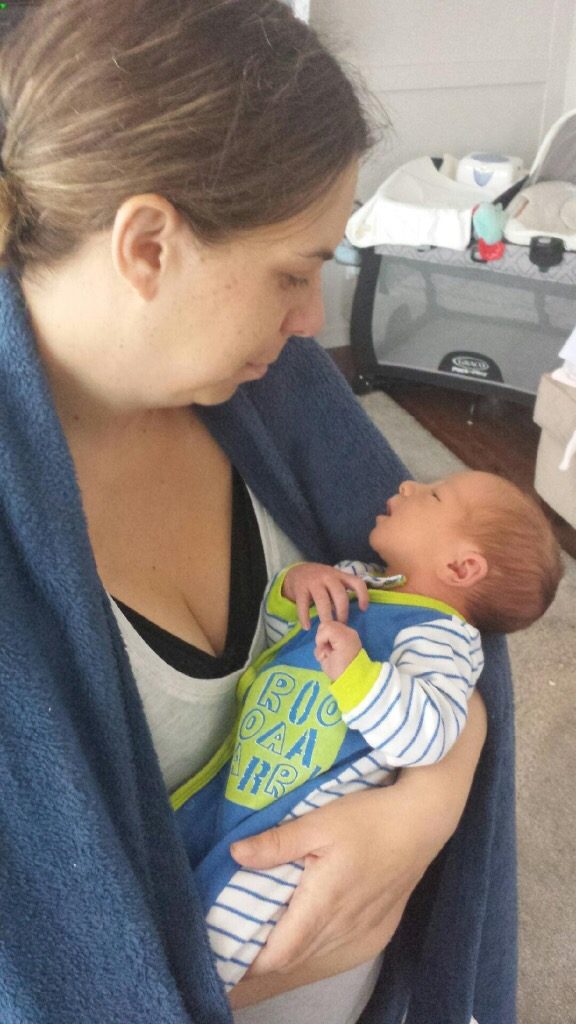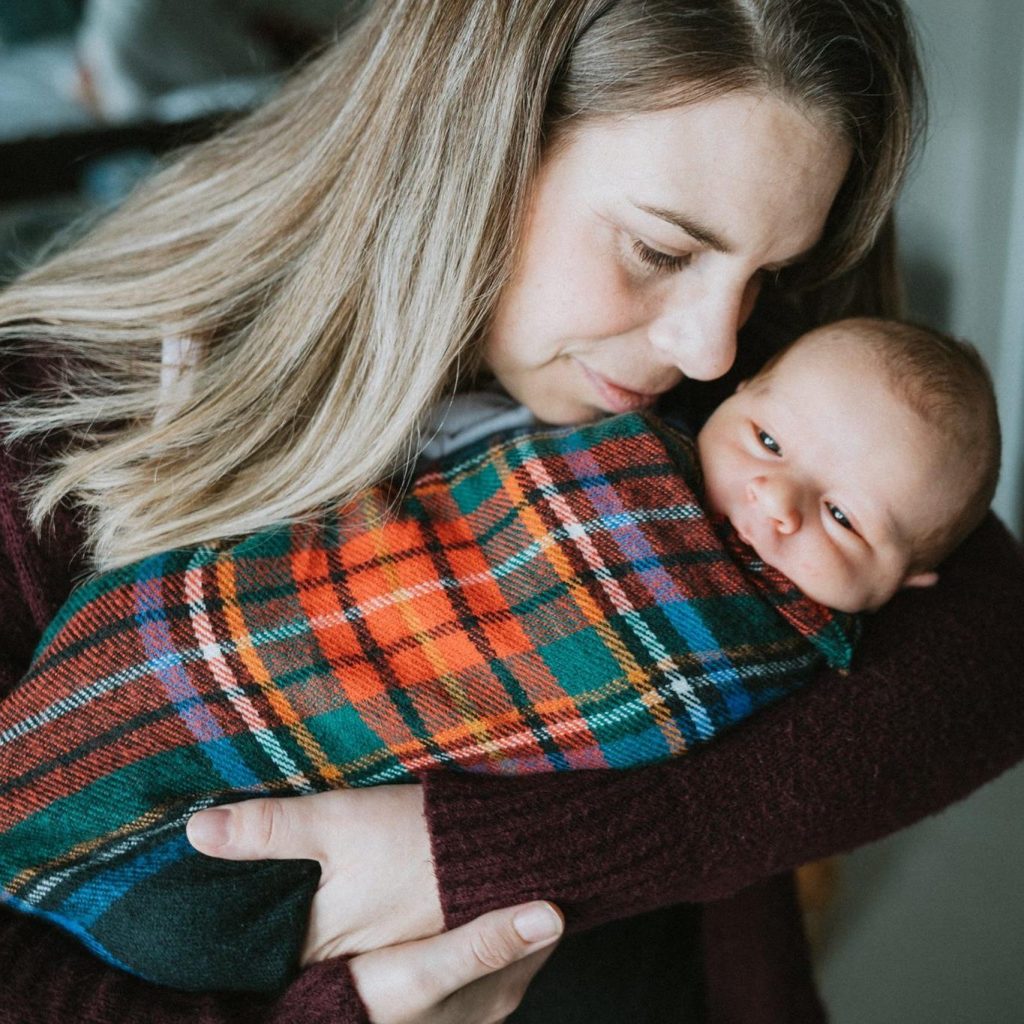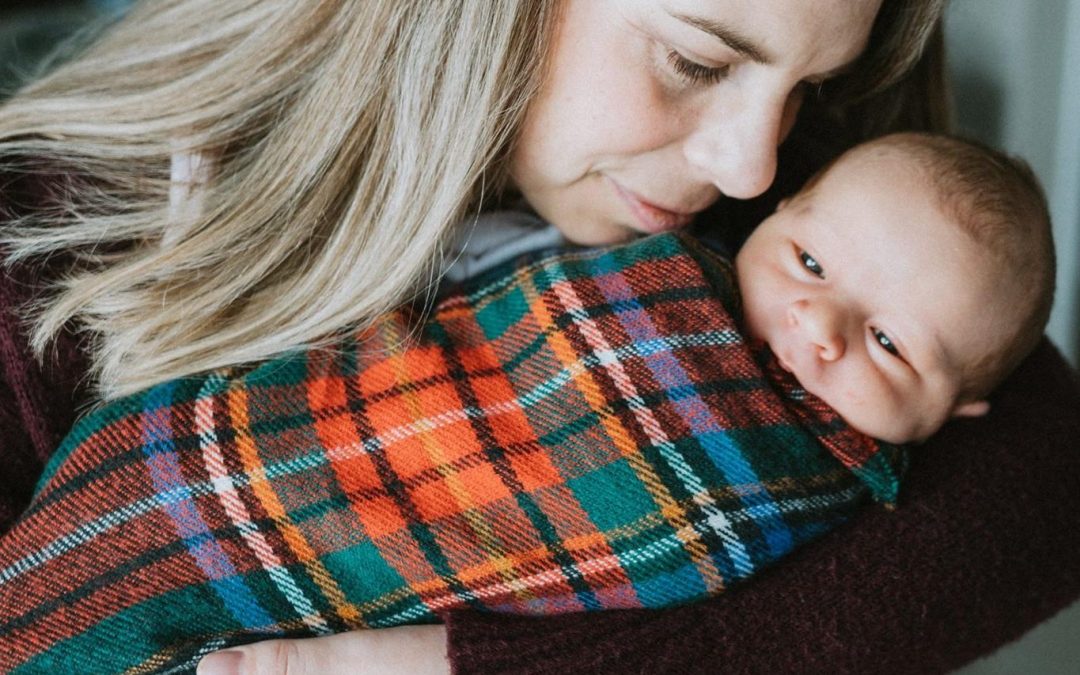For weeks following my sons birth, I was in excruciating pain from gas. It can happen when air gets trapped in your belly after having an abdominal surgery like a c-section or laparoscopic surgery. This is a very useful piece of information that’s no one told me to prepare for. I now know what the nurse meant when she said “I worry about this one because she didn’t walk enough.” as I was leaving the hospital. Again, useful information that would have saved me from this.

This was the first I was able to hold Grayden in about a week. Holding him for only a few minutes left me in so much pain, I was unable to move.
It’s common for women to experience shoulder tip pain post c-section. Air can get trapped within the diaphragm and the pain can be felt in the right shoulder (known as a referral point). Generally speaking, this pain isn’t too severe (unlink mine) and easily managed by walking and passing gas. This is why they ask if you’ve passed gas within hours of your c-section. If this was better explained, I would have paid attention to my farts and moved around more. I was under the impression movement should be limited to only when necessary and ankle pumping in bed.
As I was in the ER, there was a fentinol overdose 2 beds away, a woman who has been stabbed in the hand, and a poor old woman who kept wetting herself because she couldn’t get out of bed on her own. This was no place for a mom who had given birth just days before. Til this day, I see flashes of my time there and it haunts me. This is where I’m left traumatized. Not the circumstances of my c-section but being left in the ER.
After leaving the hospital after my 20-hour stay, I was hopeful the Percocet would have taken care of the pain for me to survive. It didn’t even touch it. made me extremely loopy. Made it easier to cope, I suppose.
My pelvic organs all shut down. I couldn’t go to the bathroom. I couldn’t feel my bladder filling but I could feel it bulging in my vagina. I was extremely bloated and my bowels were full which put a ton of pressure on my incision. I needed to be carried to get anywhere in my house. My body couldn’t function and I couldn’t take care of my newborn son or my other two kids. I was broken.
I cried every night had thoughts of suicide for 6-weeks. There was no end it sight and the thought of living another day intensified these emotions.
The pain meds were running out and there was no way I was going back to the emergency room. I started Googling my symptoms and when it turned up gas was the culprit, I was angry. I’m still angry.
I was unable to breastfeed because of the medication, the pain, and I couldn’t handle the emotional stresses of it. It hurt to sleep because laying down made the pain made things worse. And for a short period, I had to brace myself in the shower to go to the bathroom which stripped me of my dignity. I was a shell of a woman who was trying to survive. The emotional and physical pain of feeling robbed from those first few weeks with my son was hard to handle. We should have been bonding and laying skin to skin during my recovery. He should have been sleeping on my chest and night when he couldn’t sleep. I should have been nursing him and holding him close. I should still be nursing him. It took 6 weeks for me to recover. At 8-weeks, I had completely given up on breastfeeding.

Photo Credit: Michaela Shannon-Love Your Postpartum
To this day, I’m still trying to make sense of this whole experience. My anxiety has kept me from sleeping some nights. I’ve been doing my best to stay on top of postpartum depression because of my past history. I’ve been in therapy and went on antidepressants (as needed) under the guidance of my doctor to better cope. Adding more self-care is also a part of my treatment plan. I even signed up for CrossFit (after completing Post-Baby Rehab and clearance from my pelvic floor physiotherapist, of course!) But this is far from over for me.
“Studies have found that in developed countries, 10-15% of new mothers were affected by major postpartum depression”. I tried to have excellent postpartum support in place while I was still pregnant and because of this, my mental health symptoms have been less severe than past postpartum experiences. But I haven’t been completely in the clear.
In the end, it wasn’t the circumstances of my c-section that was the cause of my trauma. I felt in control and grateful it was an option. My son came to me healthy and uninjured. (To read more about the circumstances surrounding my c-section birth, click here). I felt confident in my decision and because of my training in postpartum rehab in both vaginal and c-section births, I believed there would be no complications. This was also my second abdominal surgery (I had a laparoscopic surgery a few years back), and gas never came up as a possible complication.
My son is now 6-months old and he’s incredibly happy. We’ve bonded and we have a beautiful relationship. I look at him and see my strength. My reason for not giving up. Emotionally, I’m doing better but this experience still shakes me. This has been very difficult to write but its a step towards full recovery.
Until next time,
Terrell
Is Your Pelvic Floor Dysfunction Holding You Back?
Take the first steps in managing your pelvic floor dysfunctions by grabbing your free copy of Post-Baby Fitness Handbook: 5 Steps to Managing Your Pelvic Health.
You will learn the ins and outs of core training improve your pelvic floor function, how to optimize your sleep and stress management (yep, sleep and stress have an impact on your pelvic floor, too), and the functional movements you need to build full body strength to maximize your training results.


